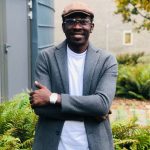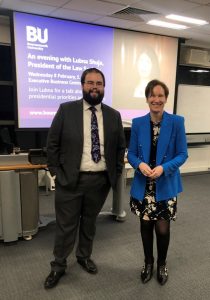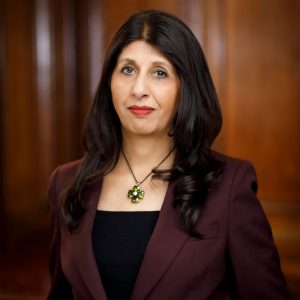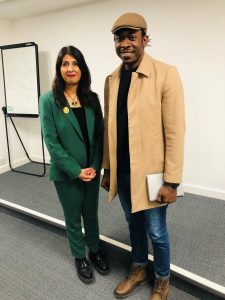 Produced by Guest blogger
Produced by Guest blogger
 This is a guest blog post written by Postgraduate Public International Law student Chiedozie Chukwujiuba Nwagu.
This is a guest blog post written by Postgraduate Public International Law student Chiedozie Chukwujiuba Nwagu.
I arrived at the Executive Business Centre on Wednesday 8 February in anticipation of guest speaker Lubna Shuja, upon my arrival I found an exciting atmosphere filled with a degree of suspense from the networking audience. On Lubna’s arrival, it was clear to see astonishment from the crowd at the legal icon’s presence.
Lubna Shuja qualified as a solicitor in 1992 and is currently the 178th person, first Asian, first Muslim, and seventh female president of the Law Society of England and Wales. Ahead of Lubna taking to the stage, Samuel Walker, Senior Lecturer in Law at Bournemouth University (BU), introduced BU’s Vice-Chancellor John Vinney to make the opening remarks.
Beginning the lecture, Lubna shared that there would be three stages to cover her journey, starting with her family and educational background.
Originally from Bradford, Lubna explained that she grew up in a working-class family with no plans whatsoever to study law. She stated that her parents constantly reminded her about the benefits of education and the importance of taking it seriously.
She explained that she never had any intentions to study law and as such, had no role model or anyone around her who was a lawyer or who was in any way connected to law. She however explained that her relations influenced her to pursue journalism.
Her choice to pursue law was because of a friend who told her that she could do really well in studying law; she could still become a journalist because the law degree would open up a world of opportunity. It was at that moment she decided to study law and began to take the necessary steps to gain admission into what used to be known as the Polytechnic of Central London but was changed to Westminster University.
Early Career and the passion for Diversity and Inclusion
 After qualifying as a solicitor in 1992, Lubna explained there were 709 solicitors nationwide and it took about 100 applications to various firms before being hired. She was made to work under a rule that prohibited women from wearing trousers, a rule applied in most courts too. She said she found the rule particularly discriminatory against Muslim women like her who by their religion couldn’t wear skirts that were above their knees.
After qualifying as a solicitor in 1992, Lubna explained there were 709 solicitors nationwide and it took about 100 applications to various firms before being hired. She was made to work under a rule that prohibited women from wearing trousers, a rule applied in most courts too. She said she found the rule particularly discriminatory against Muslim women like her who by their religion couldn’t wear skirts that were above their knees.
She said that this in addition to being among the very few persons who were from Black, Asian, and Minority Communities in the profession made her have a consciousness to pursue diversity and inclusion of young women in the profession as part of her career objectives. She has continued to push for greater diversity and inclusion throughout her legal career in the numerous organisations and committees she’s led.
The Ambitious Project:
Referring to this part of her journey as the “Ambitious Project” Lubna summarised her plan in five categories. Explaining her focus on championing a campaign to bring to light the role solicitors play in upholding the rule of law; the promotion, strengthening, and clarification of ethical issues, especially ethical dilemma’s involving the use of AI technology; providing support for members of the law society and their practice; promoting the profession and the jurisdiction internationally; and finally promoting diversity.
Lubna stressed how she has been encouraged by the recent development in the law profession, with the admission of 60% of females, but maintained that there is a need for greater diversity, highlighting a need for better representation at a senior level within the profession and the judiciary.
Encouragement:
 Finally, Lubna didn’t hesitate to state the challenges facing the profession, which she said include a lack of grants, especially for minority communities, as well as the problems of diversity and inclusion.
Finally, Lubna didn’t hesitate to state the challenges facing the profession, which she said include a lack of grants, especially for minority communities, as well as the problems of diversity and inclusion.
She spent some time encouraging us as a younger generation to challenge ourselves to push our comfort zones, to take networking seriously, as this is where it all begins, and most importantly try our possible best to acquire work experience.
Her final piece of advice was that we must not allow ourselves to think we are not ready, if we always thought we weren’t ready for anything, we’d never start.
A question-and-answer session ensued from my peers, Lubna graciously took the time to speak with us. Our excitement was clear as we stood in front of a person who reflected whom we aspired to be. The event was an absolute success

 Tips for surviving a Master’s
Tips for surviving a Master’s BU graduate named Lawyer of the Year
BU graduate named Lawyer of the Year What next? Deciding your Career Path after Graduating from BU Law.
What next? Deciding your Career Path after Graduating from BU Law.









Great and encouraging
Really an interesting short read, brilliant!! I had the perfect picture in my head.